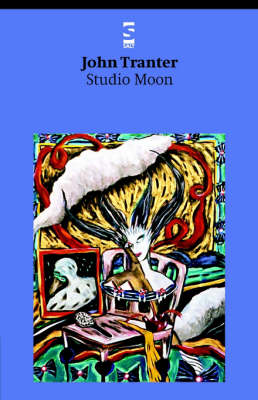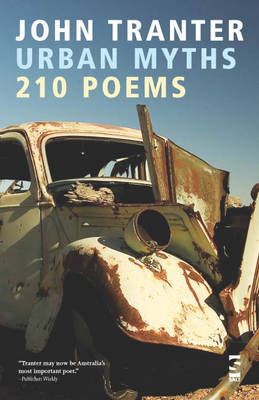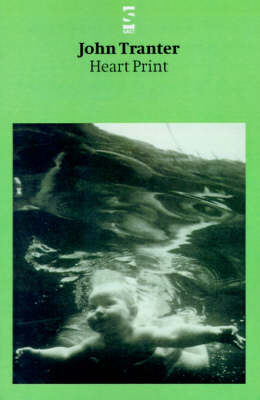Salt Modern Poets
4 total works
The poems in Studio Moon were written over the last fifteen years, and cover a wide range of styles and approaches: poems that are answers to other poets’ work, sometimes wrenched out of context (a version of Schiller’s `A Maiden from Afar’, for example, is set in a hamburger joint in Los Angeles), borrowings from Matthew Arnold and Barbara Guest, an ode, a three-page poem in sapphic stanzas, a computer-based pastiche, two deeply-felt elegies, two sestinas, four haibun, eight pantoums, and dozens of others, all imbued with Tranter’s trademark blend of wit, style and feeling.
John Tranter is an important writer in mid-career. He has published twenty-one books – four collections of work by others totalling over a thousand pages, and seventeen collections of his own writing, including Late Night Radio (Polygon, Edinburgh, 1998), Different Hands, a group of seven fiction pieces (Salt Publications, Cambridge, 1998), The Floor of Heaven, a book-length sequence of four interlinked verse narratives (Arc, UK, 2001), Heart Print (Salt Publications, Cambridge, 2001) and Borrowed Voices (Shoestring Press, Nottingham, 2002).
He compiled and edited (with Philip Mead) the Bloodaxe Book of Modern Australian Poetry. He is the publisher and editor of the much talked about literary quarterly Jacket, at jacketmagazine.com, which has received more than a third of a million visits from readers around the world.
Urban Myths collects a wide range of John Tranter's best writing from a forty-year career together with a generous selection of recent poems. His work is noted for its technical virtuosity and masterful handling of traditional forms in a modern context including sonnets, haibun, haiku, odes, elegy, and Sapphics. There are poems like snapshots, a few lines long, and a film noir story that runs for over thirty pages. There are flashes of lyrical beauty and desperate adventures, fear and loathing in America and a quiet drink in a waterfront bar in ancient Alexandria.
Many of Tranter's poems engage with literary exemplars - Callimachus, Shakespeare, Schiller, Hoelderlin, Rimbaud, Sartre, O'Hara - and hold up their attitudes and procedures to a sharp contemporary scrutiny.
Alongside his more approachable narrative, lyric and critical work John Tranter has persistently explored a project of experimentation, interrogating the traffic between speech, writing and meaning, and challenging the preconceptions of the reader. In one example, Shakespeare's The Tempest is reduced to a dozen pages; in another, a gaggle of literary figures have their work shredded in a computer only to see it reborn in a fresh guise.
For all its delight in scholarship and the ironies of history, this writing is focussed on the hopes, dreams, fears and desires of the here and now.
A fresh collection of energetic and engaging writing. These poems focus sharply on the contemporary world, from the political to the religious, from the public arena to the deeply personal, from “The aggression of foreign companies … the survival of the most / bastardly is built into the system” to “Parents were templates, / but I could not plot the father … The tractor did its work like any rusty mechanism / and his office was the open air, a church of absence.” As well as twenty-five new poems, Heart Print also brings into print over fifty pages of strong, early writing not previously published outside Australia.
From the US Publishers Weekly, March 18, 2002: “Tranter may now be Australia’s most important poet. Since the late ’60s, Tranter’s cosmopolitan, oddball verse, inspired by John Ashbery and others, has offered a post-modern, hip, slippery challenge to the better-known rural poetics of Les Murray. During the 1990s, Tranter emerged as an international figure, first by editing well-received anthologies, then with the Internet journal Jacket. […] The untitled set of 28 sonnets and delightful prose poem that conclude [Heart Print] present light-fingered commentary on subjects from “Starlight” to absinthe and middle age: “I re-live youth asleep,“ one affecting line admits, “and leave it behind at dawn.” Readers […] will see why Tranter has mattered to Australians for so long.”
John Tranter is an important writer in mid-career. He has published twenty books, including Gasoline Kisses (Equipage, Cambridge, 1997) Late Night Radio (Polygon, Edinburgh 1998), Different Hands, a collection of seven computer-assisted prose pieces (Folio/Fremantle Arts Centre Press, 1998), The Floor of Heaven, a sequence of four interlinked narrative poems (Arc, 2001), and four anthologies of other writers’ work including (with Philip Mead) the 474-page Bloodaxe Book of Modern Australian Poetry.
He is the publisher and editor of the widely-read Internet literary magazine Jacket, at http://jacketmagazine.com/
Trio is a 162-page omnibus collection of three books of poetry by leading Australian poet John Tranter published over a period of wide-ranging stylistic experiment in the 1970s.
Red Movie, John Tranter's second book, published in 1972, reveals a break or shift in his approach to poetry. The first half of the book is made up of a series of moody imagistic landscapes and fragmentary portraits of people reminiscent at times of Robert Lowell, and a memoir of country and urban adolescence. The rhetoric is mainly romantic. The ten-page poem `Red Movie' which concludes the book moves out into new territory. Its style, though lyrical, is mosaic, seeking its effects in the juxtaposition of bright and contradictory fragments. History, literature and personal experience are broken and reassembled into a patterned montage of words, an approach perhaps influenced by the authors' course-work in linguistics, Gestalt theory and field theory for his academic degree in psychology.
Crying in Early Infancy (1977) is a collection of one hundred fourteen-line poems. Five are carefully rhymed sonnets, some are solemn, but most are loose and playful and some are exuberantly incoherent. Existentialism, Marxist theory, foreign movies, Hollywood, soft drugs, homosexuality, teenage angst, cool jazz: it all goes into the blender of Tranter's art, and nothing is safe. It was the seventies, after all.
Dazed in the Ladies Lounge (1979).
Among a handful of alternately serious and light-hearted poems three longer works stand out: a study of the influence of Rimbaud, alternately grateful and scolding; a series of imaginary tableaux where five leading European intellectuals are forcibly replanted in an Australian context (Sartre at Surfers Paradise, for example); and Ode to Col Joye, a playful look at the author's fellow-poets and his own cultural setting.



